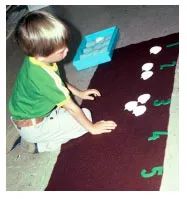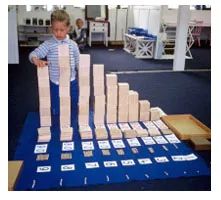Development of the Mathematical Mind
Number Work in the Montessori School: A Summary
This is a short but succinct article on how the child learns about numbers in the Age of Montessori early childhood program. It is a summary of what Maria Montessori taught at her training course in Madras, India, in 1943, which was recorded by Elisabeth Caspari.
The child’s acquisition of knowledge of number, if it is to be founded on understanding and not on memory disconnected from actual fact, should be based from the beginning upon concrete objects.

Only when he is secure in the knowledge that number is quantity, that the name of numbers are designations of quantity, and that the series of names he has learned is an actual progression, a continual addition of one, then is he equipped to venture in the realms of the abstract.
The mind is stimulated by things greater than it can as yet fathom, and is thereby urged to conquer and possess them. Things that lie too distant from our power of understanding we pass by unheeded, as things already thoroughly known and rationalized by us leave us unmoved. It is the teacher’s art to place in the child’s way a path of adventure, full of novelties and obstacles to overcome, along which he will progress with keenness and joy at the discovery of new inner powers.
Each obstacle—the counting of the quantity, the name, the symbol, the writing—the teacher should help him to overcome separately. Just so the sequence of names, the succession of addition, the place of each number in the sequence when it is chosen at random. All these new difficulties are approached gradually, by adding a new item to a familiar exercise, thus adding interest to an exercise, which already lies within his grasp. Purely verbal lessons are to be avoided. Just the fascination of doing will entice him to repeat an exercise over and over again, habituating him to the new item of knowledge contained therein. The attraction will keep its hold on him until he has possessed himself of its secret. Thus he is spared the tedious drills of learning rote facts that are unrelated in his mind to any positive realities, as the proverbial slavery of multiplication tables. Instead, the child is given activities and games, performed on concrete materials.

If the adult mind is capable to a great extent of gathering knowledge through the medium of words alone, it is by reason of the grasp he already has on the world. But the child is in the delicate position where he has still to grasp through experience the many facts that build the world around him. This grasp, which he is able to take in his formative years, is the basis of his understanding, his individuality, his independence. And it is upon this basic understanding that he builds all his future knowledge.




















